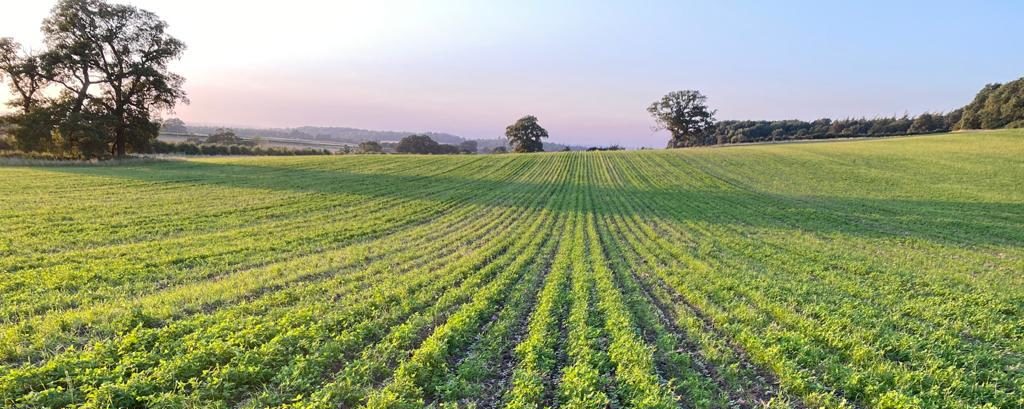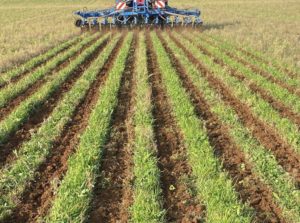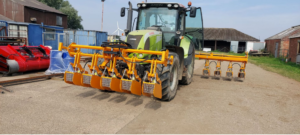


In a hugely exciting development, in the coming farm year (harvest 2022) we will be switching half of our wheat rotation into a pasture cropping system, working with Wildfarmed.
Using diverse varieties of wheat and the latest farming technology, we expect to be able to perform no ploughing or applications of fertiliser or pesticides, and still harvest a healthy crop. And in the process, we will improve our soil food web, meaning it will be harder for plants typically considered weeds, such as thistles, to grow in the fields.
This is exciting because – for laypeople – controlling weeds without using the plough or synthetic inputs (e.g., pesticides) has been the holy grail of cereal farming for decades. Even organic cereal farming, which is fertiliser and pesticide free, will often use the plough to suppress weeds before establishing a crop.
Cultivations, like ploughing, disturb the soil, damaging its health, and releasing carbon dioxide into the atmosphere. Synthetic inputs, such as pesticides, damage soil biodiversity – tiny organisms in the soil which are the heart of soil life. And so moving into Wildfarmed’s ‘pasture cropping’ system will have a huge range of benefits for us (more on this below).
The way it works is to plant the wheat in strips, rather than the traditional method of planting the seed across the whole field. In between the strips, we will have planted something called a herbage lay – this is a mix of plants, like clovers, legumes, and grasses which are beneficial to soil health.

Cultivating inbetween the herbage ley
This is where the technology comes in. To prevent the plants in the herbal ley from growing into and above the wheat, crowding it out, we use a new specialist mower. In basic terms, the mower is a tractor with 12 small strimmers on the front. Using satellite guidance that is accurate to 1-2cm, the mower can cut the herbal ley in between the strips of wheat. This means the wheat grows in a ‘polyculture system’ without the need of inputs and produces a healthy yield that we can easily harvest when it ripens.
We are extremely excited about the benefits this new system will bring to our farm. It will allow us to continue regenerating our soils, creating better fertility, sequestering carbon, and reducing soil erosion. And our Ecologist and Conservation Leader expects the system to provide great benefits for wildlife too with great cover for ground-nesting birds and our beloved Brown Hares.
Nick Padwick, the Estate & Farm Director, said “the Wildfarmed system allows us to build soil health following years of synthetic inputs and cultivations, reduce our carbon footprint and improve our farm biodiversity as well as growing grains that, if milled correctly, will produce healthier food”
Speaking to Dom our Project Manager, he said that “the move is a logical next step on our regenerative agriculture journey, which began around 10 years ago when we stopped using insecticide”.
This new system will not only be good for our natural environment, but also for us as farmers – with a good price for this high-quality grain, and minimal cost requirements, we expect it to be more profitable than a conventional wheat crop. And because the soil is in great condition thanks to the herbal ley, we can plant cereal crops over and over again without rotating other crops into the field. With wheat being our most profitable crop, this is an extra bonus!

New mower to cut in strips
This system has been pioneered by Wildfarmed, an innovative food and farming company with the mission: Fix Food, Fix The Planet. They buy the harvested grain from farmers like us, stone-mill it for flour, and sell it on to their growing network of restaurants, bakeries, schools and food processors, including at Pophams, Jolene, and Willy’s Pies. The Wildfarmed team also have grand plans to penetrate further into the market.
Our role is to grow the grain. But we’re also hoping Wild Ken Hill will become a hub for this style of farming in Norfolk. We’ve already had 5-6 other local farms join us by dedicating some land to the Wildfarmed system, taking the total in our area to around 250 acres in the first year. Others interested in bringing this system onto their farms can contact Nick Padwick.
Andy Cato, co-founder of Wildfarmed and farmer, said “It’s been an enormous pleasure and privilege to begin working with Nick Padwick. His vast experience is invaluable in our continual efforts to improve a pasture cropping system and to make it as widespread, reliable and as easy to adopt as possible. Nick and the team at Wild Ken Hill are doing amazing things and it’s hugely rewarding that our farming system is now a key part of their plans to build back healthy soils.
Ultimately, we need as many farmers as possible transitioning to more ecological methods of farming cereals. For that to happen it has to be low-risk and financially viable. Bringing together a community of growers, sharing knowledge and equipment, and providing them with a sustainable route to market is what Wildfarmed aims to do. Norfolk, as the breadbasket of the UK, couldn’t be a more important part of the country to launch our vision of getting quality grains into the food supply chain, while leaving the land rich for future harvests.”